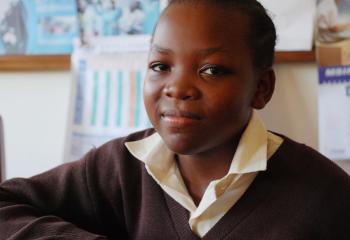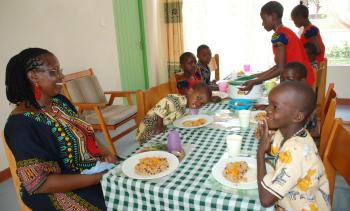For thousands, life is a daily battle

Thanks to our support, this young girl can go to school (photo: M. Peru).
There are also children in Mombasa who have lost parental care and are now living on the streets on their own, fending for themselves. Often, they get by with petty crimes but most find it hard to survive. Many of these children begin to sniff glue to numb the hunger pangs. Sometimes, whole families live on the street – sometimes for several generations. These “survivors”, as they call themselves, often have no papers or other form of identification, which makes access to education and other social services more difficult.
The commercial sex trade has been on the rise in Mombasa in recent years, catering mainly to western tourists. An estimated 30,000 boys and girls between the ages of twelve and 14 are said to be working in the city’s multitude of go-go bars and clubs. Often, these children are from poor backgrounds and are lured into the sex trade with promises of employment and a better life. The so-called “beach boys” in Mombasa cater to older, single women from the West. Many of the beach boys do not use contraception because they think white women are not affected by HIV.
Providing support – and hope for the future
SOS Children’s Villages began its work in Mombasa in 1979 to help vulnerable children. In 2008, we began running a family strengthening programme in Mombasa due to the great need for support within the local community. Especially those living in slums faced enormous difficulties, such as low income and unemployment, few schools and overcrowded classes, a lack of effective health facilities, environmental pollution with overflowing garbage, flooding due to poor drainage, poor infrastructure and no recreational facilities. In a series of workshops with community leaders, the SOS team identified the main challenges and formulated measures to alleviate hardship so that family stability can be upheld.
In addition, the SOS Social Centre at the children’s village in Mombasa supports families in feeding, clothing and providing shelter for their children, as well as ensuring that the children attend school and make progress in their learning. The SOS Social Centre also provides health services, counselling and psychological support, as well as care and assistance for families affected by HIV/AIDS.
In addition, the SOS Social Centre at the children’s village in Mombasa supports families in feeding, clothing and providing shelter for their children, as well as ensuring that the children attend school and make progress in their learning. The SOS Social Centre also provides health services, counselling and psychological support, as well as care and assistance for families affected by HIV/AIDS.
What we do in Mombasa

An SOS mother and children sit down to lunch in their recently renovated home (photo: M. Peru).
The children attend the SOS Kindergarten together with children from the neighbourhood. This ensures that children from SOS families make friends and are integrated into the local community from a young age. The children then go on to complete their primary education at the SOS Hermann Gmeiner School in Mombasa, which can be attended by over 480 pupils from the children’s village and the neighbourhood.
When young people from the SOS Children’s Village feel ready to move out of the family home in order to pursue further education or vocational training, the SOS Youth Programme makes shared accommodation available. The young people live together and, with the support of a qualified counsellor, they learn to take responsibility, plan for their future and prepare for independent adult life.